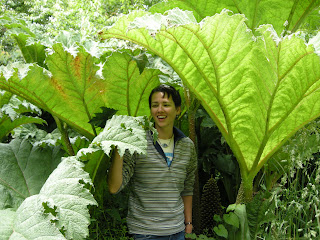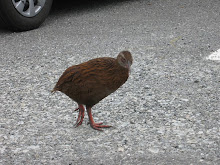 For anyone who doesn’t know me well, I’m Alaskan born and Maine educated, a city girl turned agriculture major. I graduated this spring with my Bachelor of Science in Sustainable Agriculture, and immediately got an excellent job working for the University of Alaska Fairbanks and Tanana Chiefs Conference. So, what am I doing all the way down here in New Zealand, doing manual labor for no money?
For anyone who doesn’t know me well, I’m Alaskan born and Maine educated, a city girl turned agriculture major. I graduated this spring with my Bachelor of Science in Sustainable Agriculture, and immediately got an excellent job working for the University of Alaska Fairbanks and Tanana Chiefs Conference. So, what am I doing all the way down here in New Zealand, doing manual labor for no money?I think it’s to do with that very first King salmon I ever caught. Even little city girls get to go fishing in Alaska, so I was just four years old when the big one hit. I was innocently dangling my line over the side of my family’s 14-foot inflatable boat as we trawled the freezing grey waters of Cook Inlet, completely unprepared for the violence about to occur. I can’t recall the strike as the fish took my hook, but I remember the heave that nearly pulled my arms out of their sockets, and I remember the clamp of my dad’s hands around my waist as I headed overboard. The strain in my hands as I reeled and reeled, the frantic flopping excitement when it came over the side, silver and perfect and very upset. It outweighed me.
Since that moment, I’ve been fascinated with the food I eat, and with the wider relationship between the human species and all the myriad forms of life that sustain us. Food is among our most practical and basic needs, and also one of our most decadent pleasures. The things we eat can build our bodies up healthy and strong, or make us ill and weak. So, too, can the way we obtain the things we eat help to build resilient and diverse ecosystems, or lead to unstable, unhealthy monocultures, vulnerable to every vagary of pest and weather. Most of the agriculture and land management currently happening in the U.S. is driving us toward the latter two outcomes, rather than the former.
I suspect that this is the case in most of the developed world, but if any country is doing it better, it’ll be New Zealand. They have their fair share of challenges, such as extreme distance from markets for their agricultural products, a very fragile native ecosystem, and of course the occasional freezing gust of air blown up from Antarctica. They also have lots of advantages we lack, such as a normally gentle climate, insulation from any agricultural pests and diseases, a human population that is still in proportion to the local environment, and liberal-leaning policies to go with their “green” image. One local condition is especially interesting: 35 years ago, the New Zealand agricultural industry was propped up by government funds for a few big commodities, exactly as ours is today. The Kiwis were considerably quicker on the uptake than us, though, and ditched that system completely. The result was a difficult but ultimately very rewarding re-organization, a shift back toward smaller, more environmentally-conscious farms. Hey, isn’t that what we want?
I've been desperate to get down here, to see how all these conditions actually play out for small organic and alternative farmers. Luckily, I’m not the first person to want to travel and learn about agriculture at the same time. The Worldwide Opportunities on Organic Farms (or WWOOF) program has been operating in New Zealand since the early 1970’s, and there are over 1000 hosts in this year’s directory. For eight glorious months I’ll exchange 4 or 5 hours of my time per day for a seat at the dinner table on farms of all types and sizes. I’ll learn pelnty of practical skills, and have a chance to talk with some of the most knowledgeable experts on ecology and food: the people who actually steward the land from which our sustenance springs.
This is an education for me, just as surely as my degree work, though the learning may come through unusual channels: I am out here not to comprehend the diagram of the electrical circuit, but to get shocked by the stock fence. My questions are both abstract (what is the value of responsibly-produced food?) and pragmatic (exactly how does one shear a sheep?). They are questions of a personal nature (shall I farm dairy or veggies?) and also of wider significance (is it easier to get along as a country of 4 million than 400 million?). You are hereby invited to join me on the journey to attempt to answer these and many, many more.









I found you by searching for kanuka pics, As it happens I am a Woof host in Nz and I really enjoyed reading your story, can those kanuka pictures be true? Id like to ask you permission to use one of them for my website encouraging the replanting of native trees.
ReplyDeleteBest
tim@naturalseeding.co.nz